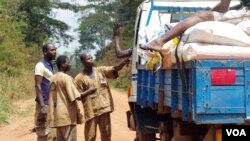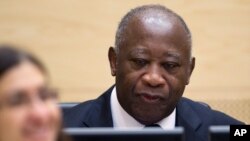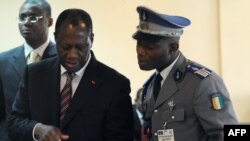DUEKOUE, IVORY COAST —
Former Ivory Coast President Laurent Gbagbo is set to appear before judges at the International Criminal Court Tuesday. He faces charges of crimes against humanity in the wake of the violent conflict that plagued the West African nation after national elections in 2010. The confirmation of charges hearing will allow judges to determine whether Gbagbo’s case should go to trial. But in the western Ivory Coast town of Duekoue, a flashpoint of the conflict, some Gbagbo supporters are wondering why no one is being held accountable for atrocities they say were committed against them.
In Duekoue’s Carrefour neighborhood, a group of boys plays football across the street from a lumpy plot of grass. The plot is a mass grave containing dozens of bodies of victims of a massacre during Ivory Coast’s election crisis.
On March 29, 2011, fighters loyal to Ivory Coast’s current president, Alassane Ouattara, stormed the neighborhood in search of supporters of former president and political rival Gbagbo. In the ensuing violence, hundreds of civilians are believed to have been killed.
A United Nations report concluded that most of the victims appeared to have been killed by Ouattara's fighters, but that scores were also killed by Gbagbo troops.
Gbagbo’s refusal to accept defeat by Ouattara in Ivory Coast's November 2010 runoff vote sparked six months of violence that claimed at least 3,000 lives. But while evidence collected by rights groups and journalists suggests that serious crimes were committed by both sides, so far only Gbagbo supporters have been charged and detained both in local courts and at the International Criminal Court at The Hague.
That angers 49-year-old Georges Doue, a Carrefour resident who lost seven relatives, including an elder brother, during the Duekoue massacre. His wife had given birth the day before the attack, and she fled to the town’s Catholic mission with their newborn son still attached by the umbilical cord.
He says the people who attacked are the ones who are in power now and ruling the country. They are not worried at all, he says, and it is difficult to see. He says these same people are still circulating and carrying guns, and this is a situation that traumatizes the community.
For months after the fighting stopped and Ouattara assumed office in May 2011, residents of Duekoue complained of abuses carried out by Ouattara’s army, including beatings and summary executions. Residents today say these crimes have decreased considerably. But illegal roadblocks are still being operated by soldiers and traditional hunters known as dozos, who often demand bribes in exchange for passage.
Ouattara has promised to investigate reports of human rights abuses. But there is concern that judicial officials have been slow to look into crimes committed after the conflict ended.
Last July, a camp for displaced persons - many of them from Carrefour - was burned down by an angry mob that local residents say received assistance from the army and dozo hunters. At least eight people were killed, though rights groups have said the number may be higher.
Colette Goungnonhi, who lives in a village three kilometers outside of Duekoue, lost her pregnant daughter and a young grandson in the Carrefour raid, and later was forced to flee the attack on the camp for displaced persons.
Though she supported Gbagbo in the 2010 election, she said she had no problem with the ICC proceedings against him, and that if he committed crimes he should be punished. But she said the same should apply to Ouattara’s fighters.
She says we do not know who we can complain to. She says she feels a pain in her heart when she sees the security forces. "I feel revolted," she says. "I have no power and I have no ability to change things.”
In Duekoue’s Carrefour neighborhood, a group of boys plays football across the street from a lumpy plot of grass. The plot is a mass grave containing dozens of bodies of victims of a massacre during Ivory Coast’s election crisis.
On March 29, 2011, fighters loyal to Ivory Coast’s current president, Alassane Ouattara, stormed the neighborhood in search of supporters of former president and political rival Gbagbo. In the ensuing violence, hundreds of civilians are believed to have been killed.
A United Nations report concluded that most of the victims appeared to have been killed by Ouattara's fighters, but that scores were also killed by Gbagbo troops.
Gbagbo’s refusal to accept defeat by Ouattara in Ivory Coast's November 2010 runoff vote sparked six months of violence that claimed at least 3,000 lives. But while evidence collected by rights groups and journalists suggests that serious crimes were committed by both sides, so far only Gbagbo supporters have been charged and detained both in local courts and at the International Criminal Court at The Hague.
That angers 49-year-old Georges Doue, a Carrefour resident who lost seven relatives, including an elder brother, during the Duekoue massacre. His wife had given birth the day before the attack, and she fled to the town’s Catholic mission with their newborn son still attached by the umbilical cord.
He says the people who attacked are the ones who are in power now and ruling the country. They are not worried at all, he says, and it is difficult to see. He says these same people are still circulating and carrying guns, and this is a situation that traumatizes the community.
For months after the fighting stopped and Ouattara assumed office in May 2011, residents of Duekoue complained of abuses carried out by Ouattara’s army, including beatings and summary executions. Residents today say these crimes have decreased considerably. But illegal roadblocks are still being operated by soldiers and traditional hunters known as dozos, who often demand bribes in exchange for passage.
Ouattara has promised to investigate reports of human rights abuses. But there is concern that judicial officials have been slow to look into crimes committed after the conflict ended.
Last July, a camp for displaced persons - many of them from Carrefour - was burned down by an angry mob that local residents say received assistance from the army and dozo hunters. At least eight people were killed, though rights groups have said the number may be higher.
Colette Goungnonhi, who lives in a village three kilometers outside of Duekoue, lost her pregnant daughter and a young grandson in the Carrefour raid, and later was forced to flee the attack on the camp for displaced persons.
Though she supported Gbagbo in the 2010 election, she said she had no problem with the ICC proceedings against him, and that if he committed crimes he should be punished. But she said the same should apply to Ouattara’s fighters.
She says we do not know who we can complain to. She says she feels a pain in her heart when she sees the security forces. "I feel revolted," she says. "I have no power and I have no ability to change things.”






